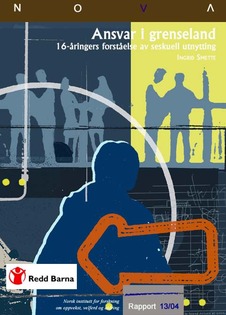| dc.description.abstract | Summary This study explores how adolescents understand concepts relating to sexual exploitation and abuse. Furthermore, it investigates their perceptions of youths’ and adults’ different roles in relationships that the judicial system defines as exploitative or abusive. The report is based on focus groups interviews with a number of 16-year olds, who were recruited from upper secondary schools and from an Internet cafe run by the municipality of Oslo. As background material, several relevant legal texts are analysed and discussed. Relationships between minors and adults established via the Internet and youth selling sexual services - two phenomena often referred to as examples of sexual exploitation of youth - are used to approach the concepts of interest for this study. The following research questions are discussed: How do youth perceive the concepts of sexual abuse and sexual exploitation, and in which ways do their perceptions differ from the legal principles? Which factors influence whether youth define an incident as sexual exploitation or abuse? How are conceptions of maturity and the transition between childhood and youth reflected in the adolescents’ perceptions of exploitation and abuse? What are the consequences of these perceptions for how measures to protect children and youth should be designed and implemented? The UN Convention of the Rights of the Child as well as the Norwegian judicial system assert that a minor’s consent to a sexual relationship with an adult has no impact on the question of culpability. The reason given for disregarding the young person’s consent is that a young person or a child, due to his or her age and level of maturity, is in a subordinate position in a relationship with an adult, and thus vulnerable to exploitation. The youth that were interviewed challenge this legal understanding, as they do not agree that age differences necessarily imply a general power inequality in the sense that the legal framework presupposes. They therefore claim that being young does not exempt a person from being responsible for one’s acts, even in a relationship with an adult. Consequently, the youth create a distinction between the concept of exploitation and the concept of abuse, and take the latter to mean incidents where there is coercion, and the former - exploitation - to mean incidents where the young person has consented to the relationship. However, their claim about young peoples’ responsibility for sexual exploitation must be understood with regard to how they experience being a youth, compared to being a child. For them, increasing responsibility is a key feature of the transition between childhood and youth, and eventually adulthood. The title of the report, "Responsibility in transition" (Ansvar i grenseland), therefore points to the way in which concepts of sexual exploitations are related to the drawing of categorical borders related to age, and to the observation that these borders are not always drawn in the same places by adults and youth. Gender is another key factor in the youths’ definitions and categorisations of abuse and exploitation. The interview material reveals that abuse and exploitations are seen as things that primarily happen to girls. Girls are considered to be more vulnerable psychologically - through the understanding that girls are more seriously harmed by abuse than boys - and socially - by the way in which girls are categorised by their sexual reputation. The views of the young people indicate that traditional conceptions of gender still are important to their perceptions in this area. In the youths’ discussions of relationships between minors and adults established via the Internet as well as in their views about youth selling sexual services, the tendency to ascribe responsibility to the minor is reinforced. In both cyberspace and the prostitution context,the youth stressed the competence of minors to make rational choices, and thus to avoid engaging in relationships that are risky, such as with persons met via the Internet, or practices that imply violations of key norms relating to sexuality, such as prostitution. The youths’ emphasis and willingness to assume responsibility constitute important challenges for prevention of sexual exploitation of youth. This willingness must in a certain sense be considered both inevitable and positive. However, it also highlights the need to focus on adults’ legal and ethical responsibility to protect youth from exploitation; particularly in a transitional life phase where they become vulnerable, not as passive victims, but as a consequence of their eagerness to assume such responsibility. In further research in this field, it will be important to develop a conceptual framework and theoretical models that can accommodate such awareness. | en |
| dc.description.abstract | Seksuell utnytting av barn og unge har blir satt på dagsorden på ulike måter av myndigheter, organisasjoner og media. Men hvilke konkrete fenomener er det man snakker om? Snakker alle om det samme? Denne rapporten nærmer seg dette temaet gjennom en kvalitativ analyse av 16-åringers forståelser av seksuell utnytting. Ungdommene er rekruttert fra grunnkursklasser i videregående skoler på Østlandet samt fra en kommunal internettkafé. Begrepene «nettmøter» - møter mellom ungdom og voksne etablert via internett - og «ungdomsprostitusjon» blir brukt som utgangspunkt for å få tilgang til ungdommenes oppfatninger og holdninger. Rapportens hovedproblemstilling er hvordan ungdom forstår seksuell utnytting og seksuelle overgrep, og på hvilke måter deres forståelser eventuelt skiller seg fra rettsapparatets definisjoner. Videre drøftes hvordan oppfatninger av modenhet og av grensen mellom barn og ungdom reflekteres i ungdommenes synspunkter, og hvilke konsekvenser disse forståelsene har for hvordan beskyttelse av barn og unge mot seksuell utnytting og overgrep bør utformes. Bak prosjektet står følgende organisasjoner: Redd Barna, ECPAT Norge, PRESS, Støttesenteret mot Incest i Oslo, MiRA Ressurssenter for innvandrer- og flyktningkvinner, Agenda X ved Antirasistisk Senter, Nasjonalt kunnskapssenter om vold og traumatisk stress og Pro-sentret. | no_NB |
